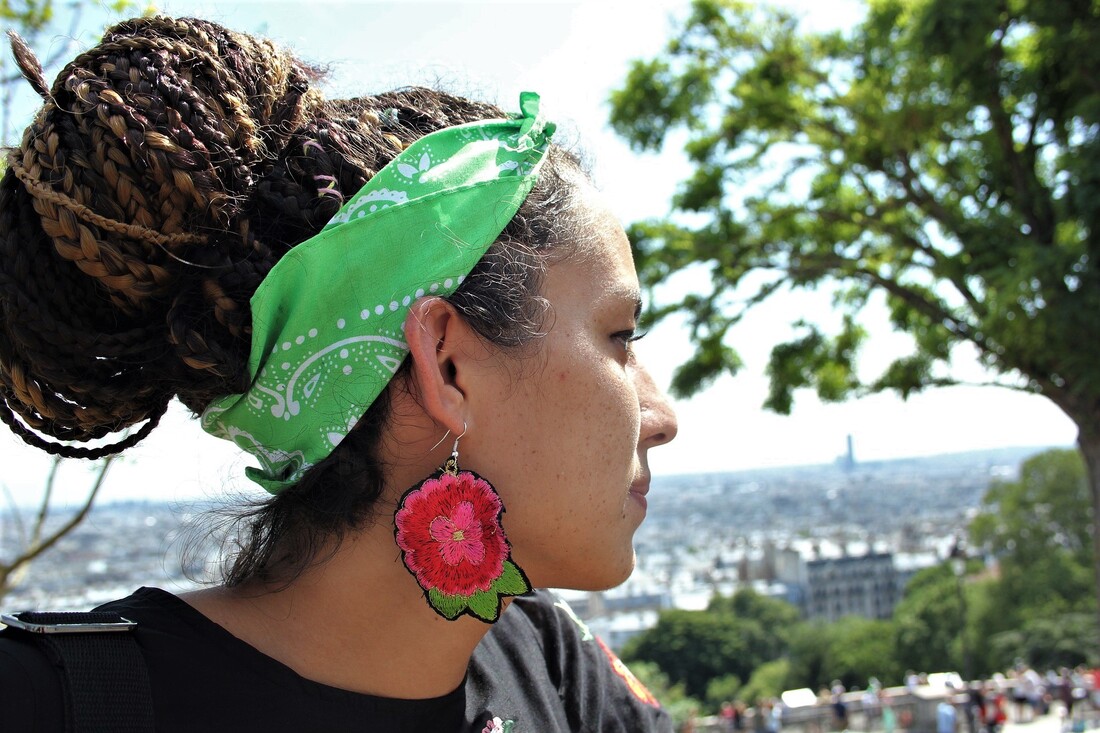|
‘Those who hope in Christ can no longer put up with reality as it is but begin to suffer under it and to oppose it. Because I believe in eternal life, I shall be active for the life of the people. Because I hope in the resurrection, I shall take part in the revolt of the people against all deadly oppressive powers.’ (Jürgen Moltmann) It was tough living under martial law. Her father and neighbours were working hard in the fields during harvest time. As evening approached, without realising it, they were out slightly later than was allowed under the imposed curfew. When soldiers appeared, the farmers didn’t expect to have their hands and feet tied or to be wrongly accused of insurgency. Her father, now badly beaten and blooded, was dragged home to his wooden hut and thrown down a bank. She was only 5 years old at the time and, witnessing this horror, in desperation picked up a stone and threw it at one of the soldiers. He pulled out a gun, held it to her head and said, ‘I could kill you.’ Only the intervention of another soldier saved her: ‘Leave her. She’s a child.’ As I listened to this simple yet harrowing account, I could only imagine how this incident, this trauma, could have impacted on this young girl’s life. Certainly, as an adult, it has influenced her passion and stance against injustice, particularly violence in whatever form – whether physical via war, social-psychological via exclusion or insidious via corruption – against the poorest and most vulnerable people. Some years later, her uncle, a leader in a remote village, opposed the unethical practices of a powerful business and paid for it with his life. She too was hunted by a death squad for challenging a corrupt government official in front of the media. Only after he too was murdered, could she and her family return safely to their home. It's a world that terrifies me. I don’t know if I could find the courage to stand firm on my beliefs and values in such circumstances. I’m afraid that I would shrink back, try to protect myself – and find ways to justify it. Later in her childhood years, this girl met Mother Teresa of Calcutta who placed her hands on her head and prayed for her. I do wonder if something profoundly spiritual happened in that moment. She throws her life on Jesus – for others, in love – relentlessly and at significant personal cost. When I appeal to her to keep safe, she cautions me to beware of being too safe: ‘If you cling to your life, you will lose it; but if you give up your life for Jesus, you will find it.’ Jesus is her hard-edged hope. She takes him at his word.
16 Comments
Diversity: a problem to be solved...or an opportunity to be grasped? What do you think? 'Whatever affects one directly, affects all indirectly.' (Martin Luther King) DEI, EDI, DIE..acronyms, used interchangeably with a similar meaning. It’s the stuff of diversity, equality/equity and inclusion. If the very sight of those words makes you yawn with boredom or roll your eyes with frustration, DEI experts and advocates need to ask why. To see a glowing example of passion, creativity and inspiration in this arena, have a glance at Shine! The challenges that EDI sets out to tackle are important, complex and human. They affect very real, vulnerable and disenfranchised people in organisations and the wider world. Most DEI policies and plans I see represent implicitly: (a) a legal rights-based approach; that is, to offer protection against illegal discrimination, and ensure equality of access to opportunities and resources; and (b) a humanistic values-based approach; that is, to treat everyone respectfully as human beings, and appreciate the differences between people. Both offer a critical baseline for healthy conduct and behaviour in liberal-democratic societies. We could think of these approaches as, essentially, ideologically-based. They flow from a vision of organisations and societies in which, in particular, people and groups that are non-dominant and less-privileged are offered special protection and support so that they, alongside others, can enjoy free and fulfilling lives. They recognise a genuine risk in any group or society that less-powerful people will be and become marginalised by the cultural interests and priorities of the privileged majority. Against this backdrop, EDI initiatives often prioritise, first and foremost, legal and policy requirements as core foundations. An underlying challenge for these types of ideological approaches is how to gain and sustain traction if others, especially those in powerful positions, don’t share the same vision and values, or a desire to prioritise them. An unintended consequence of effective recent social-political lobbies such as LGBTQ+, BLM and Extinction Rebellion has been to create a silent-silenced group that, for reasons of expediency, presents a convincing, socially-presentable façade, yet with no real substance behind it or commitment to change. Climate activist Greta Thunberg calls this out as the cynical ‘Blah, blah, blah’ phenomenon. For the DEI venture to exert greater transformational influence and impact, I believe those who promote it need to become better at evaluating and demonstrating the tangible benefits of diversity: especially to the pragmatist-sceptics. It’s not enough to create and enforce laws and policies, important as they are for protection, equality and inclusion. It’s not enough to appeal for kinder, fairer and more tolerant organisations – although, as a follower of Jesus – I see such qualities as having intrinsic value. EDI's core proposition that 'diversity is a good thing' will prove far more persuasive if it can show convincingly why. I may have something useful to offer here. For many years, I have had the privilege of working internationally with leaders and professionals from diverse cultures and backgrounds. I often use a powerful, small-group, peer-coaching method called ‘Action Learning’. It enables people who face wicked problems to make better decisions, faster. Diversity in such a group is a critical success factor because it enables a person to unpack an issue, stress-test her or his assumptions and create innovative solutions – precisely because peers pose stretching questions from vastly different perspectives and experience-bases. One organisation I worked with had a strong commitment to DEI. It employed people from a wide range of countries and backgrounds and worked hard to ensure that everyone was treated in the same way. Ironically, its efforts had inadvertently blinded it to the value of difference. It missed completely the significant potential that such diversity can offer when running projects, dealing with challenging issues etc. I invited the leaders to engage in a simple experiment – to create problem-solving and innovation teams based on radical diversity as the key team criterion, irrespective of formal role. The results were truly astonishing. As EDI progresses, develops and learns, I believe that this kind of testing, evidencing and presenting of practical benefits, alongside issuing or enforcing an ethical call, will prove vital and fruitful. It will be an invaluable area for further research. I work with asylum-seekers and refugees who often feel depressed and frustrated by being characterised as helpless victims, rather than as resourceful contributors who want to show they can make a difference. Legal rights-based and humanitarian values-based approaches to DEI are a critical bedrock. A benefits-outcomes approach could ensure an additional life-giving dimension. ‘Your choice point is the space you're in right before you make a decision.’ (Martha Tesema) You are choosing to read this blog – you could have chosen to do something else instead. You are choosing to read it now – you could have chosen to read it at a different time. In fact, according to psychological choice theory, everything you do is a choice. You’re not always aware of it and it won’t always feel like it. The implications and consequences of choosing one course of action over another can sometimes be so different and so stark that it can feel to, to all intents and purposes, as if there is no choice. Yet you are still likely to choose the action that, for instance, aligns most closely with your values; or has the greatest perceived benefits; or has the least risks or detrimental effects. The implications of this theory are radical and extreme. If every action you take represents a choice, and if you can grow in awareness of the choices you are making at each moment, a vast array of possibilities opens up to you. As you approach any decision, it will be like reaching a road junction, with always at least 2 options available to you. You will no longer be trapped or driven entirely by circumstances. You can exercise greater freedom and personal agency. You can learn to navigate adaptively through choices, like tacking into the wind on a sailboat. You can become more creative and innovative. You can visit places, reach destinations, that you never dreamed imaginable. There is a flip side. If you really are free to choose, you’re also responsible for your every action. It could feel easier to tell yourself that you have no choice – especially since you can’t anticipate every potential ripple effect. It would relieve you of the burden of accountability. You could also feel quite overwhelmed by the dread of having to make choices at every moment in time, in every situation. It could feel like existentialist Jean-Paul Sartre’s nightmare, ‘condemned to be free’. You may try to alleviate the anxiety by telling yourself that you’re a product of your background, upbringing, culture or circumstances. Then you could stop over-thinking, over-analysing, and get on with your life. So, how to handle this paradox? How to create the liberating freedom of expanding one’s sense and reality of choice whilst also to acknowledge the ethical and practical responsibilities it carries with it? First: awareness. Here’s a simple exercise. Write down a paragraph of no more than 100 words that describes the last meeting you had with a colleague. Now, underline every word that represents a choice point in what happened. If you do this rigorously enough, you will be amazed at how much of the text is highlighted. Now the stretch, a thought experiment: jot down at least 2 different choices you could have made at each choice point. Try to be creative and courageous as you do this. Second: responsibility. To build on this exercise, jot down a list of key criteria that will help you to ensure focus, priorities and boundaries to your decisions and actions. Here are some examples: ‘make best use of my time; achieve my career goals; develop the team’s potential; improve quality of relationships; create best value for stakeholders’. These criteria reflect and represent your values. Finally, test the actual choices you made, and the hypothetical choices you could have made, against these criteria to take note of what you could have done differently, what you could do next time and what lines you will not cross. Now – it’s your choice: given what you know now, what will you do with it? (See also: Choose; Choice; Agents of Change) 'To err is human. To blame it on someone else shows great management potential.' That made me laugh! It’s a fun variation of Hubert H. Humprey’s, ‘To err is human. To blame someone else is politics.’ But wow – how easy it is to deflect and project our own faults and failures outwards onto others. We see it happen all over the place, from interpersonal relationships to international relations. It’s a way of defending ourselves; of trying to avoid or escape the costs of responsibility; of promoting ourselves; of appearing innocent or superior. It’s about helping us to feel good about ourselves and-or wanting someone else to feel good about us. It's quite tricky if we don’t know we’re doing it – and it can lead to potential high-risk consequences. ‘Self-deception is like this. It blinds us to the true causes of problems, and once we’re blind, all the solutions we can think of will actually make matters worse.’ (Arbinger Institute: Leadership and Self-Deception, 2000). This poses a difficult question: how to deal with our blindness if we don’t know we’re blind? And what if, if we’re honest – for whatever reason – we don’t want to know? An old adage goes: ‘There are none so blind as those that won’t see.’ Ignorance is bliss? I’ll start with the last question first. If I’m working with a person in coaching or a group in action learning and I sense resistance in this area, I won’t push too hard. It could, for instance, trigger repressed trauma or suppressed anxiety. Instead, I may pose an invitation, e.g. ‘Is this something you would find useful to explore further? What, for you, would be the potential benefits of exploring this, or the potential costs of not exploring it? If you were to explore this, what support or challenge would you need from yourself, me and-or others?’ It’s their call, their choice. Next to the first question. This touches on a field known as critical reflexivity. It’s like holding up a mirror to ourselves rather than fixing our gaze elsewhere or onto others. We can think of it as something like this: ‘What within me – e.g. in my own past, culture or world – is influencing what I’m thinking, feeling and doing now?’ This could include, for instance, our beliefs, values, hopes, fears and expectations. It could also include hidden vested interests; that is, things we want to protect or preserve and-or to acquire or achieve. Such influences act as subconscious filters. In coaching and action learning, I work with people and groups to help them learn to pose searching questions to themselves in a spirit of open curiosity and discovery, e.g. ‘Who or what is holding my attention in this relationship or situation? How am I feeling? Who or what am I not-noticing? What assumptions am I making? How is my past influencing my present? Who or what matters most to me now? How might I be evoking this response in the other party? What am I willing to take responsibility for? What do I want or need? What am I willing to stop, start, change or compromise?’ The outcomes and benefits of this approach can be truly transformational. It calls for humility, courage, authenticity and a willingness to exercise personal leadership and agency, yet can open up all kinds of fresh possibilities – and hope. Imagine, for instance, to approach an adversary, prayerfully, in the midst of conflict: 'We are in such a mess. I'm sorry...and, as I look at how we got here, I could have handled my part in this better...' It’s a stark contrast to avoidance, accusation and finger-pointing. What a possibility to co-create a different relationship – and a different future. (See also: Spots; Art of Deception; Stealth) |
Nick WrightI'm a psychological coach, trainer and OD consultant. Curious to discover how can I help you? Get in touch! Like what you read? Simply enter your email address below to receive regular blog updates!
|







 RSS Feed
RSS Feed